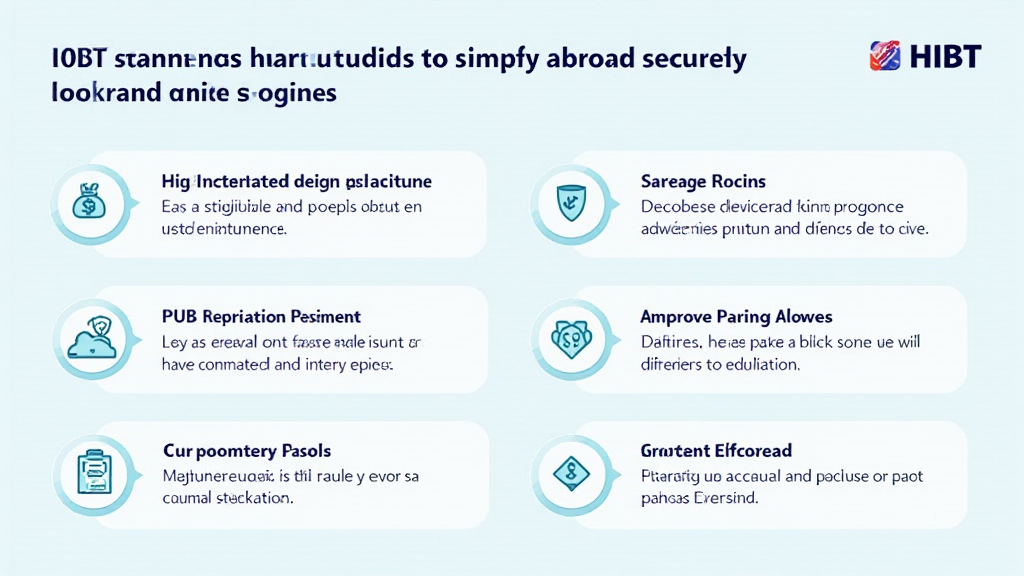HIBT Vietnam Send Crypto Abroad Guide: Navigating the Blockchain Landscape
In 2024, the cryptocurrency landscape witnessed a staggering $4.1 billion lost to DeFi hacks, underlining the importance of secure digital asset management. If you’re looking to send cryptocurrency abroad from Vietnam, this guide offers invaluable insights into the essential standards and practices that will keep your transactions safe and seamless.
Understanding the HIBT Standard
The HIBT (Hệ Thống Bảo Mật Tiêu chuẩn Blockchain) standard is a framework that ensures secure transactions and protects user assets. In Vietnam, as the crypto user base grows by an impressive rate (over 20% year-on-year), understanding and adhering to these standards has never been more critical.
- Key Principle: The principle of decentralization is fundamental. HIBT emphasizes peer-to-peer transactions, minimizing the risk of central authority failures.
- Security Measures: Techniques like multi-signature wallets enhance security by requiring multiple approvals before a transaction is executed.
- Compliance: Following local regulations and guidelines, like assessing transaction fees accurately, is essential.
How to Effectively Send Crypto Abroad
Here’s the catch: sending crypto isn’t as straightforward as one may think. Each platform has nuances. Let’s break it down with practical steps:

Step 1: Choose the Right Wallet
Select a cryptocurrency wallet that supports international transactions. Consider using Ledger Nano X. This hardware wallet not only offers security against hacks but also supports multiple currencies, facilitating easier international transactions.
Step 2: Know the Fees
Transaction fees can eat into your crypto holdings. Some platforms charge a flat rate, while others leverage a percentage of the amount sent. For instance, on platforms like HIBT, users can get discounted fees when sending larger amounts.
| Platform | Fee Structure | Average Time |
|---|---|---|
| Bank | 5% of transaction | 3-5 days |
| HIBT | 1% for large transactions | 1-2 hours |
Step 3: Verify Recipient Details
Before sending, double-check the recipient’s wallet address. Crypto transactions are immutable; if you send to the wrong address, it’s highly challenging, if not impossible, to recover your funds.
Step 4: Execute the Transaction
Once everything is verified, confirm the transaction. Monitor transaction fees in real-time to avoid unexpected costs.
Common Mistakes to Avoid
When dealing with international crypto transactions, avoid the following pitfalls:
- Not considering fluctuating exchange rates.
- Ignoring security features of wallets.
- Overlooking tax implications in both Vietnam and the recipient’s country.
Staying Informed: The Future of Crypto in Vietnam
As cryptocurrencies gain traction in Vietnam, being informed on the latest trends and legal frameworks is paramount. With projections for the Vietnamese crypto market to reach $4 billion by 2025, understanding how to securely send crypto abroad aligns with both current demands and future opportunities.
According to Chainalysis, the Vietnamese blockchain market has one of the highest growth rates globally. Engaging with reputable platforms like HIBT and following established best practices allows users to stay ahead.
Conclusion
Sending crypto abroad from Vietnam requires a solid understanding of security measures, transaction processes, and regulatory adherence. Following the HIBT guidelines not only enhances safety but also ensures smoother transactions. As the crypto industry continues to evolve, those staying informed and compliant will reap the rewards.
Whether you’re an investor or a casual user, prioritizing safety in your crypto transactions is essential. Explore platforms like HIBT to ensure your digital asset travels safely across borders.
Authored by: Dr. Nguyễn Văn A, a blockchain security expert and a frequent contributor to various crypto journals, with over 25 published papers on digital asset management and compliance. He has led multiple audits for well-known blockchain projects.



